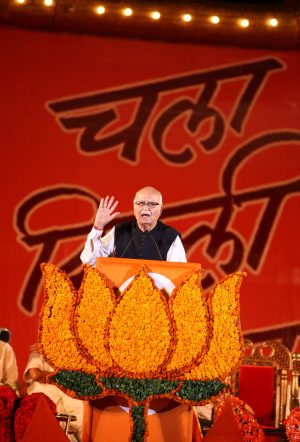In a development that is likely to further antagonize India’s Muslims, as well as add to the growing chorus of concerned calls about the country’s slide towards majoritarianism, a special court in Lucknow today acquitted all accused – including the country’s former Deputy Prime Minister and Bharatiya Janata Party (BJP) leader Lal Krishna Advani – of conspiring to demolish a 16th-century mosque in Ayodhya, a town in the Indian state of Uttar Pradesh, on December 6, 1992. Hindu hardliners claim the mosque was built at the behest of Mughal emperor Babur, after the razing of a preexisting Hindu temple there. According to many Hindus, the disputed site of the mosque is the birthplace of Ram, a key figure in that religion.
The complete destruction of the mosque marked a watershed moment in modern Indian history and led to widespread Hindu-Muslim riots across India, killing thousands, with at least 700 people dead in the Indian city of Mumbai (then called Bombay) alone. In November last year, in another landmark verdict, the Indian Supreme Court awarded the land on which the Babri mosque stood to a Hindu trust, while noting that the destruction of the mosque itself was “an egregious violation of the rule of law” and “a calculated act of destroying a place of public worship.” Today’s ruling claims to the contrary, observing that the destruction was not “pre-planned.”
Indian Prime Minister Narendra Modi had inaugurated the construction of a temple on the land awarded by the Supreme Court to the Hindus on August 5 this year.
In 1990, prior to the destruction of the mosque, Advani had sought to travel from the western state of Gujarat to Ayodhya in a flat-bed truck refashioned as a chariot in order to drum up support for the construction of a Hindu temple there, before being intercepted and arrested in the state of Bihar. One of the earliest examples of Hindu mass mobilization for politico-religious purposes, Advani’s campaign triggered sporadic outbreaks of violence. Heeding his call, thousands of young Hindu men volunteered for the cause, congregating in Ayodhya.
On the day of the mosque’s destruction, Advani, and others who were acquitted today, were present near the site and allegedly delivered incendiary speeches; the Lucknow special court today noted in its judgement that “the audio of the speeches [which were submitted as part of evidence gathered by the Central Bureau of Investigation] were … not clear.”
The destruction of the Babri mosque marked a turning point in Indian politics, when political Hinduism emerged as a significant electoral force. A BJP-led government served a full five-year term for the first time beginning in 1999, after a very short stint in power in 1996, and another period between 1998 and 1999. With the election of Modi in 2014, and again for a second term starting last year, the party’s control over Indian politics remains unmatched. Meanwhile, on Modi’s watch, Advani and other key BJP leaders who spearheaded the Ayodhya campaign, including Murli Manohar Joshi (also acquitted today), have been quietly sidelined within the party.
In a way, today’s verdict ensures that these figures will be able to fade into the political sunset.

































